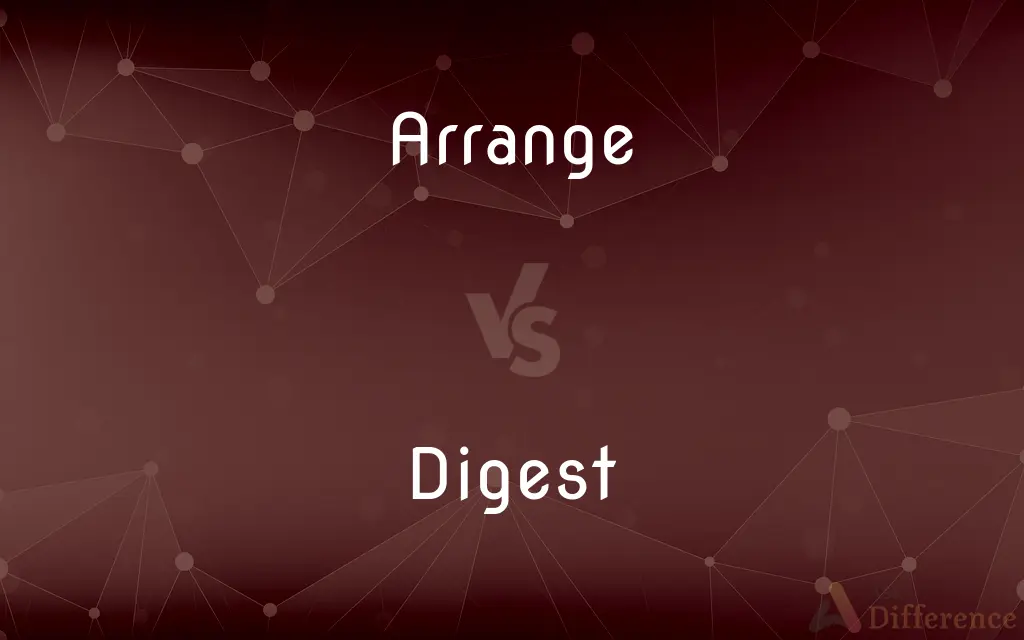Arrange vs. Digest — What's the Difference?
By Maham Liaqat & Fiza Rafique — Updated on April 17, 2024
Arrange involves putting in order, planning, or preparing, while digest refers to breaking down food or information for absorption or understanding.

Difference Between Arrange and Digest
Table of Contents
ADVERTISEMENT
Key Differences
Arrange typically implies organizing objects, tasks, or ideas into a systematic or pleasing order, whereas digest often pertains to the biological or mental process of breaking down complex substances or information.
When you arrange a meeting, you're setting the time, participants, and agenda, while digesting a meeting's content involves understanding and assimilating the discussed points.
Arranging a room might involve deciding where furniture should go for optimal space usage, on the other hand, digesting a book's content requires mentally processing and retaining the information read.
In the context of software, arrange could mean organizing data or code efficiently, whereas digesting could refer to the execution of algorithms that process this data for use or analysis.
Musical arrangements involve adapting a composition for particular instruments or voices, while digesting music might mean comprehending and appreciating the structure and elements of the music.
ADVERTISEMENT
Comparison Chart
Definition
To put in order or prepare systematically.
To break down food or information.
Usage in Context
Planning events, organizing spaces.
Biological digestion, understanding content.
Process
Involves planning, ordering.
Involves breaking down, absorbing.
Outcome
Orderly setup, planned result.
Absorbed nutrients, understood information.
Associated Fields
Logistics, management.
Biology, psychology, education.
Compare with Definitions
Arrange
To place or position things in a particular order.
She arranged the chairs in a circle.
Digest
To endure or tolerate a situation mentally.
She needed time to digest the bad news.
Arrange
To settle or resolve an agreement or conflict.
The lawyer arranged the terms of the settlement.
Digest
To thoroughly understand or absorb information.
He digested the report over the weekend.
Arrange
To plan or prepare for an event or activity.
They arranged a surprise birthday party.
Digest
To break down food in the digestive system.
The stomach digests proteins and fats.
Arrange
To organize or set up with a specific purpose or intention.
She arranged the documents by date.
Digest
To process data or details, typically by a computer.
The software digests the input data to generate reports.
Arrange
To adapt or orchestrate music for different instruments.
He arranged the piece for a string quartet.
Digest
To condense or summarize content into a shorter form.
The editor digested the lengthy article into a brief summary.
Arrange
Arrange is a mythological figure from the Australian aboriginal creation myth of the Alyawarre people for Karlu Karlu. In the myth, the figure Arrange, who is also referred to as the devil man, comes from Ayleparrarntenhe.
Digest
To convert (food) into simpler chemical compounds that can be absorbed and assimilated by an organism, as by chemical and muscular action in the digestive tract.
Arrange
To put into a specific order or relation; dispose
Arrange shoes in a neat row.
Digest
To think over so as to understand; absorb or assimilate
It took a minute to digest the implications of the remark.
Arrange
To plan or prepare for
Arrange a picnic.
Digest
To organize into a systematic arrangement, usually by summarizing or classifying.
Arrange
To bring about or come to an agreement concerning; settle
Have the bride and groom arranged the date of the wedding?.
Digest
To condense or abridge (a written work).
Arrange
(Music) To adapt or rework (a composition) for other instruments or voices or as another style of performance.
Digest
(Biochemistry) To decompose (organic compounds), especially by the action of enzymes or bacteria.
Arrange
To come to an agreement
Arrange with a friend for a ride to work.
Digest
(Chemistry) To soften or disintegrate by means of chemical action, heat, or moisture.
Arrange
To cause something to happen or make plans for something to happen
Arrange for a big wedding.
Digest
To become assimilated into the body.
Arrange
(transitive) To set up; to organize; to put into an orderly sequence or arrangement.
Digest
To assimilate food substances.
Arrange
To plan; to prepare in advance.
To arrange to meet; to arrange for supper
Digest
(Biochemistry) To undergo decomposition, especially by the action of enzymes or bacteria.
Arrange
To prepare and adapt an already-written composition for presentation in other than its original form.
Digest
(Chemistry) To undergo exposure to heat, liquids, or chemical agents.
Arrange
Rearranged rendition of a song; arrangement
Digest
A collection of previously published material, such as articles, essays, or reports, usually in edited or condensed form.
Arrange
To put in proper order; to dispose (persons, or parts) in the manner intended, or best suited for the purpose; as, troops arranged for battle.
So [they] came to the market place, and there he arranged his men in the streets.
[They] were beginning to arrange their hampers.
A mechanism previously arranged.
Digest
(Law) A systematic arrangement of abstracts from court decisions designed to simplify the locating of relevant case law.
Arrange
To adjust or settle; to prepare; to determine; as, to arrange the preliminaries of an undertaking.
Digest
A periodical containing literary abridgments or other condensed works.
Arrange
Put into a proper or systematic order;
Arrange the books on the shelves in chronological order
Digest
Digest See pandect.
Arrange
Make arrangements for;
Can you arrange a meeting with the President?
Digest
A product of biochemical digestion
Purifying the peptides in a digest.
Arrange
Plan, organize, and carry out (an event)
Digest
(transitive) To distribute or arrange methodically; to work over and classify; to reduce to portions for ready use or application.
To digest laws
Arrange
Set (printed matter) into a specific format;
Format this letter so it can be printed out
Digest
(transitive) To think over and arrange methodically in the mind; to reduce to a plan or method; to receive in the mind and consider carefully; to get an understanding of; to comprehend.
Arrange
Arrange attractively;
Dress my hair for the wedding
Digest
To bear comfortably or patiently; to be reconciled to; to brook.
Arrange
Adapt for performance in a different way;
Set this poem to music
Digest
To expose to a gentle heat in a boiler or matrass, as a preparation for chemical operations.
Arrange
Arrange thoughts, ideas, temporal events, etc.;
Arrange my schedule
Set up one's life
I put these memories with those of bygone times
Digest
(intransitive) To undergo digestion.
I just ate an omelette and I'm waiting for it to digest.
Digest
To suppurate; to generate pus, as an ulcer.
Digest
To cause to suppurate, or generate pus, as an ulcer or wound.
Digest
To ripen; to mature.
Digest
To quieten or reduce (a negative feeling, such as anger or grief)
Digest
That which is digested; especially, that which is worked over, classified, and arranged under proper heads or titles
Digest
A compilation of statutes or decisions analytically arranged; a summary of laws.
Comyn's Digest
The United States Digest
Digest
Any collection of articles, as an Internet mailing list including a week's postings, or a magazine arranging a collection of writings.
Reader's Digest is published monthly.
The weekly email digest contains all the messages exchanged during the past week.
Digest
(cryptography) The result of applying a hash function to a message.
Digest
To distribute or arrange methodically; to work over and classify; to reduce to portions for ready use or application; as, to digest the laws, etc.
Joining them together and digesting them into order.
We have cause to be glad that matters are so well digested.
Digest
To think over and arrange methodically in the mind; to reduce to a plan or method; to receive in the mind and consider carefully; to get an understanding of; to comprehend.
Feelingly digest the words you speak in prayer.
How shall this bosom multiplied digestThe senate's courtesy?
Digest
To appropriate for strengthening and comfort.
Grant that we may in such wise hear them [the Scriptures], read, mark, learn, and inwardly digest them.
Digest
Hence: To bear comfortably or patiently; to be reconciled to; to brook.
I never can digest the loss of most of Origin's works.
Digest
To soften by heat and moisture; to expose to a gentle heat in a boiler or matrass, as a preparation for chemical operations.
Digest
To dispose to suppurate, or generate healthy pus, as an ulcer or wound.
Digest
To ripen; to mature.
Well-digested fruits.
Digest
To quiet or abate, as anger or grief.
Digest
To undergo digestion; as, food digests well or ill.
Digest
To suppurate; to generate pus, as an ulcer.
Digest
That which is digested; especially, that which is worked over, classified, and arranged under proper heads or titles
A complete digest of Hindu and Mahommedan laws after the model of Justinian's celebrated Pandects.
They made a sort of institute and digest of anarchy, called the Rights of Man.
Digest
A periodical that summarizes the news
Digest
Something that is compiled (as into a single book or file)
Digest
Convert food into absorbable substances;
I cannot digest milk products
Digest
Arrange and integrate in the mind;
I cannot digest all this information
Digest
Put up with something or somebody unpleasant;
I cannot bear his constant criticism
The new secretary had to endure a lot of unprofessional remarks
He learned to tolerate the heat
She stuck out two years in a miserable marriage
Digest
Become assimilated into the body;
Protein digests in a few hours
Digest
Systematize, as by classifying and summarizing;
The government digested the entire law into a code
Digest
Soften or disintegrate, as by undergoing exposure to heat or moisture
Digest
Make more concise;
Condense the contents of a book into a summary
Digest
Soften or disintegrate by means of chemical action, heat, or moisture
Common Curiosities
Is arranging always related to physical objects?
No, arranging can also involve concepts, events, or digital data.
Can arranging affect productivity?
Yes, effective arranging of tasks and workspaces can significantly enhance productivity and efficiency.
Can you arrange music for different instruments?
Yes, arranging music involves adapting compositions for performance by different types of instruments or voices.
What does it mean to digest a book?
Digesting a book means thoroughly understanding and assimilating its content, often over some time.
How long does it take to digest food?
It typically takes about 6 to 8 hours for food to pass through the stomach and small intestine.
What does it mean to arrange a meeting?
Arranging a meeting involves setting a date, time, location, and agenda for the meeting.
How does the stomach help digest food?
The stomach uses acids and enzymes to break down food into nutrients that can be absorbed.
What's the difference between arranging and organizing?
Arranging often implies a purposeful setup for immediate use, while organizing might have a broader, more systematic approach.
How does one digest complicated information effectively?
Effective digestion of complicated information often involves breaking it down into smaller parts and relating it to existing knowledge.
What does a musical arranger do?
A musical arranger adapts compositions to suit specific performers or ensembles, often altering harmonies, instrumentation, and structure.
How does emotional digestion work?
Emotional digestion involves processing and coming to terms with one's feelings, similar to how one might understand complex information.
What tools can help with arranging data?
Tools like spreadsheets, databases, and project management software are useful for arranging data.
Share Your Discovery

Previous Comparison
Coercion vs. Blackmail
Next Comparison
Empyema vs. PhlegmonAuthor Spotlight
Written by
Maham LiaqatCo-written by
Fiza RafiqueFiza Rafique is a skilled content writer at AskDifference.com, where she meticulously refines and enhances written pieces. Drawing from her vast editorial expertise, Fiza ensures clarity, accuracy, and precision in every article. Passionate about language, she continually seeks to elevate the quality of content for readers worldwide.
















































